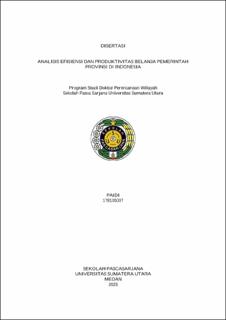| dc.contributor.advisor | Hasyim, Sirojuzilam | |
| dc.contributor.advisor | Lubis, Suwardi | |
| dc.contributor.advisor | Purwoko, Agus | |
| dc.contributor.author | Paidi, Paidi | |
| dc.date.accessioned | 2025-09-29T08:20:41Z | |
| dc.date.available | 2025-09-29T08:20:41Z | |
| dc.date.issued | 2023 | |
| dc.identifier.uri | https://repositori.usu.ac.id/handle/123456789/108774 | |
| dc.description.abstract | The Indonesian government in carrying out its duties as a government organizer has the aim of improving the welfare and prosperity of the people. Local governments have wider flexibility to manage their regions through regional autonomy policies. Local governments are expected to be able to focus more on improving community welfare in optimizing the implementation of government in each of these regions. This study aims to evaluate the factors influencing the development of the region indicated by the human development index in the area. In its implementation, this study analyzes the Level of Efficiency, Level of Productivity, Economic Openness, Degree of Fiscal Autonomy, and Democracy towards Regional Development in Indonesia during the period 2016 – 2020. This research uses a quantitative approach and the type of data used is secondary data. Data analysis techniques use descriptive statistical analysis and inferential statistical analysis. The effectiveness and efficiency of government budget functions were evaluated using Data Envelopment Analysis (DEA). The research model was evaluated by using panel data regression with the eviews application. The results showed that the provinces that are most efficient in managing their budgets are the provinces of Central Java, Bali, North Sulawesi, Gorontalo, and Papua. The province with the highest level of productivity comes from North Sumatra Province. Panel regression shows that Indonesia's Efficiency Level and Productivity Index have a positive and significant effect on Regional Development. Trade Openness and Indonesia Democracy Index hav a positive and insignificant effect on Regional Development. The degree of Fiscal Autonomy has a negative and insignificant effect on Regional Development. Thus, the government needs to focus on the efficiency of using the budget and democracy in its region in order to optimize regional development. This study also indicates that the level of Fiscal Autonomy in a region must be managed properly. Too high a DOF can degrade the achievement of the development of the territory in general. | en_US |
| dc.language.iso | id | en_US |
| dc.publisher | Universitas Sumatera Utara | en_US |
| dc.subject | Regional Development | en_US |
| dc.subject | Budget Efficiency | en_US |
| dc.subject | Productivity | en_US |
| dc.subject | Trade Openess | en_US |
| dc.subject | Fiscal Autonomy | en_US |
| dc.subject | Democracy | en_US |
| dc.title | Analisis Efisiensi dan Produktivitas Belanja Pemerintah Provinsi di Indonesia | en_US |
| dc.title.alternative | Analysis of the Efficiency and Productivity of Provincial Government Spending in Indonesia | en_US |
| dc.type | Thesis | en_US |
| dc.identifier.nim | NIM178105007 | |
| dc.identifier.nidn | NIDN0018086303 | |
| dc.identifier.nidn | NIDN0010085807 | |
| dc.identifier.nidn | NIDN0001087402 | |
| dc.identifier.kodeprodi | KODEPRODI95003#Perencanaan Wilayah | |
| dc.description.pages | 271 Pages | en_US |
| dc.description.type | Disertasi Doktor | en_US |
| dc.subject.sdgs | SDGs 8. Decent Work And Economic Growth | en_US |


